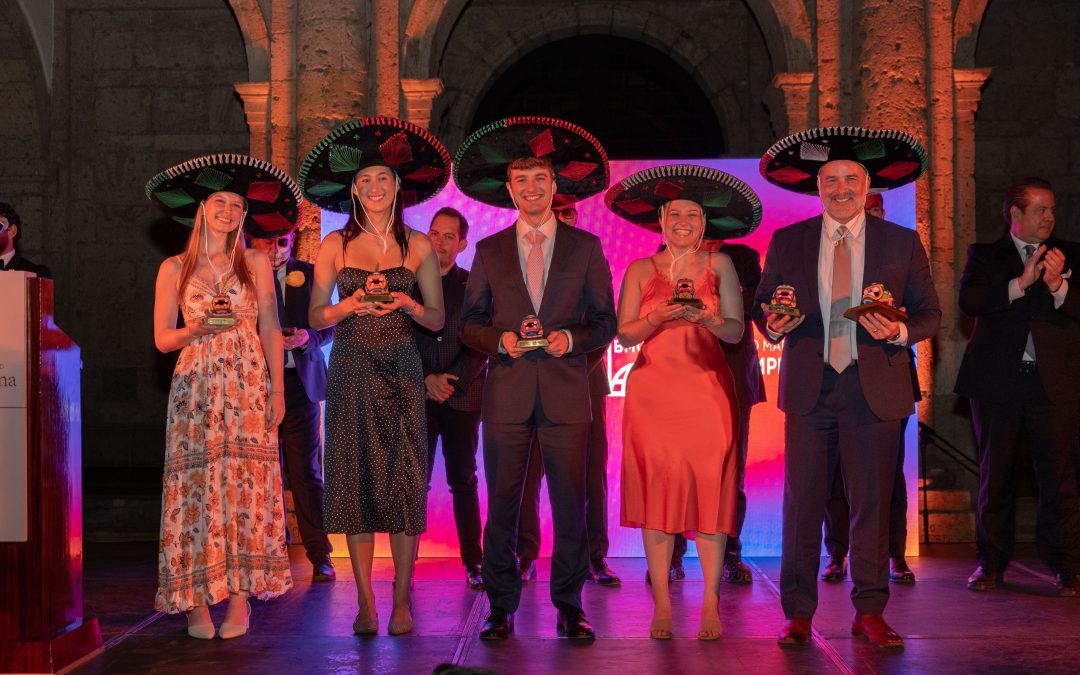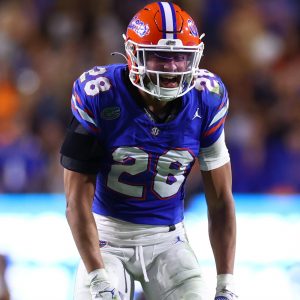Three-peat: Heavener students win three international case competitions
The past few months have been victorious for the University of Florida’s Heavener School of Business as three student teams won first place in three international case competitions: Business and Management Case Competition, John Molson Undergraduate Case Competition and Belgrade Business International Case Competition.
“Competing in case competitions pushes us to think strategically under pressure, collaborate effectively, and apply business concepts to real-world challenges,” undergraduate student Ashton Bacon (BSBA ‘25) said. “Solving complex problems for global companies has reinforced our interest in consulting, strategy, and entrepreneurship while refining our analytical and public speaking skills. Moving forward, we’re motivated to take on bigger challenges, learn from diverse business landscapes, and leverage these experiences to excel in our careers.”
Business and Management Case Competition
Undergraduate students Heather Andrasik (BSBA ‘25), Emma Arigo (BSBA ‘26), Drew Delimitros (BSBA ‘26) and Madison Passmore (BSBA ‘25) won the Business and Management Case Competition (BMCC) last November.
The BMCC was hosted by the Universidad Panamericana and took place in Guadalajara, Mexico. In this competition, students acted as consultants to work on a company case and proposed solutions. This year, the students focused on developing a market entry strategy for Mexican candy company De La Rosa, and modernizing and expanding Lucha Libre AAA Worldwide.
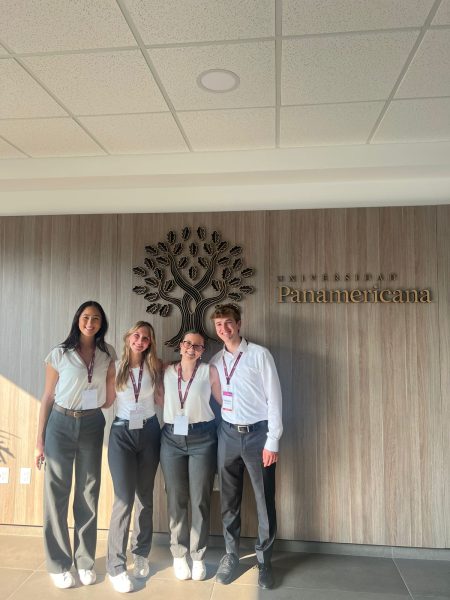
Business and Management Case Competition Team
The team worked on cases from past competitions and received guidance from Heavener International Case Competition team (HICC) president and past BMCC winner Ashley Lau to prepare for this competition. Despite the time constraints and sickness the team faced, the team was hungry yet fueled for a win.
In the De La Rosa Case, the team proposed a phased China expansion with partnerships for the company to become a trading wholly foreign-owned enterprise. They also recommended online initiatives and a flagship store for an omnichannel marketing campaign.
For the Lucha Libre AAA case, the team recommended a new training academy with a U.S. Lucha Legacy tour and a new mobile game app to expand their company and appeal to a younger demographic.
In both of these cases, their coach Instructional Professor and Oral Communication Coordinator Sean Limon said they were so in tune with the Mexican culture and how it related to the cases that allowed them to achieve a clear win.
“The case companies were very unique, and we loved getting to use our creativity when coming up with solutions,” Emma Arigo said. “Something unique about case competitions is that the sponsoring companies give you real problems they are facing and are currently working to solve. This is an amazing hands-on learning experience for us to get to work on the same problems and present our recommendations to senior executives.
“Winning first place in the competition feels extremely rewarding, and very exciting as it was our first win of the school year. Winning this competition was especially exciting because it is the first time in HICC team history that the team has won a competition two years in a row.”
John Molson Undergraduate Case Competition
A few months later, Hayden Roddy (BSAc ‘25), Heather Andrasik, Sarah Pagels (BABA ‘26, MIB ‘26) and Krish Sagar (BSBA ‘26) proudly represented the Heavener School of Business in the John Molson Undergraduate Case Competition (JMUCC) in Montreal, Canada.
The JMUCC is hosted by Concordia University and provides the opportunity for the top business schools to be placed on the largest international stage of undergraduate business competitions. This year, twenty-four teams from across the world competed in three 3-hour and one 24-hour real-world cases to display their strategic thinking, problem solving and decision making. Then, the top six teams became finalists, presenting their solutions to over 100 people and a panel of judges to win the competition.
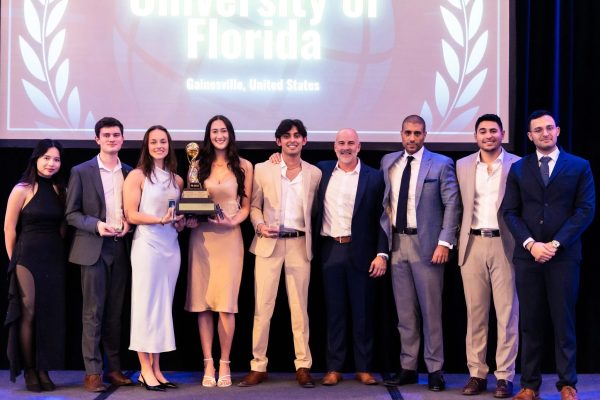
John Molson Undergraduate Case Competition Team
The team had to work for four companies: an asset management firm, a global food service company, a commercial real estate firm and a Canadian music festival. These companies sought solutions for a range of areas including change management, human resources, consumer trends, improving services, tenant advisory services and market shares.
In the first three-hour case, the team won by three points by improving internal communications and partnering with other universities. In the second, the team partnered with restaurant groups and decentralized operations through virtual kitchens. Finally, their third solution won by seven points (the largest point split of the competition) as they increased value-added services through an integrated online platform.
The team’s approach to the 24-hour case was their biggest risk, yet one of their biggest successes in the competition. Their proposal included pop-up events and partnerships with a sustainable drink brand, however, they decided not to address one of the key challenges they were given. After analyzing the company and industry, they decided to focus on the areas that would have a larger impact, which contributed to their win.
“We learned that taking risks are sometimes necessary to get ahead, as scary as it can be, and these can be the biggest learning opportunities,” Hayden Roddy said.
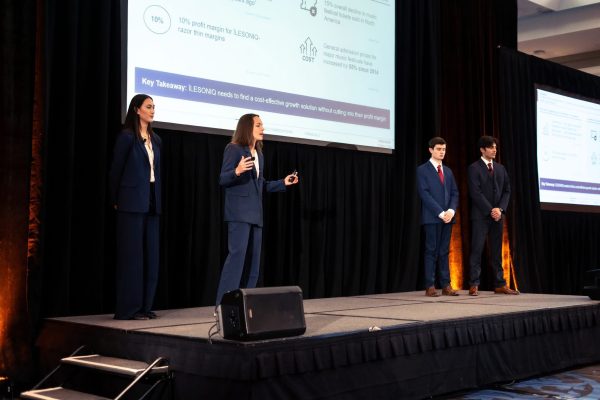
John Molson Undergraduate Case Competition Presentation
In addition to winning the overall competition, team member Sarah Pagels won “best speaker” out of 24 finalists for her 8-minute opening analysis.
Their proposed solutions and victory extended beyond the competition; the companies in their third and fourth cases informed the team that they are interested in implementing their solutions.
“Winning JMUCC is an amazing feeling and something we’re extremely proud of,” Roddy said. “The week started with us losing our luggage and half the team getting food poisoning, but we persevered because we knew we were representing the business school and UF on one of the largest international stages. JMUCC has been a dream of ours to win as one of the hardest competitions to compete in, and saying we’re ecstatic would be an understatement.”
Belgrade Business International Case Competition
The final team was composed of undergraduate students Krish Sagar, Heather Andrasik, Sarah Pagels and Ashton Bacon (BSBA ‘25) as they competed in the Belgrade Business International Case Competition (BBICC) on March 9-15.
The BBICC brings together twenty teams from across the globe to solve real-world business problems with innovative solutions and relevant knowledge in Belgrade, Serbia. This year, they challenged their participants to work on cases from cyber security company Oktacron, the Chamber of Commerce and Industry of Serbia and biopharmaceutical company MSD Serbia.
With three of these students competing in the JMUCC the week before, time was of the essence when preparing for this competition. With the time constraints, they worked on two practice cases with their whole team and gathered insight from their prior teammate winners.
This competition was a story of resilience and overcoming adversity. In the first case, the team developed a market strategy for emerging cybersecurity technology. However, the presentation did not go as well as planned and they ended up in the bottom third of the twenty teams.
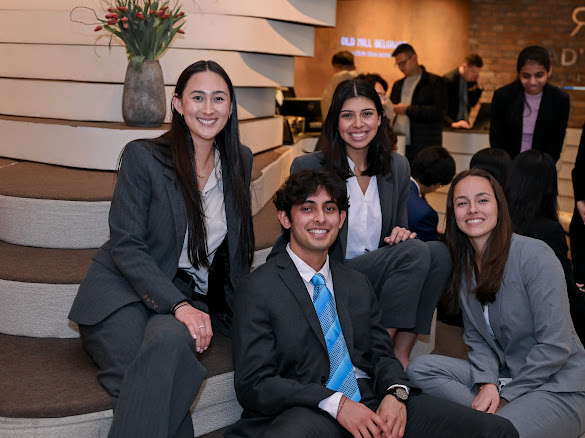
Belgrade Business International Case Competition Team
However, instead of dwelling on their setback, they owned their mistakes and learned from them. After developing a strategic framework to drive economic resilience and innovation for the Chamber of Commerce and Industry of Serbia, the team reached fourth place.
The judges were particularly impressed with the team’s financial assessment.
“The VP of the Chamber of Commerce & Industry said that despite not being given any company data, our financial projections were ‘accurate to the exact decimal,’” explained Andrasik.
But these resilient Heavener Gators were going for the gold. In their third case for MSD Serbia, they focused on increasing public awareness by improving accessibility and designing a scalable strategy. They received the maximum number of points for this case and got first place for the finals.
“They had to overcome adversity and what I was really proud of them for is for the resilience they had,” Limon said. “They earned that win.”
“Winning this competition is an incredibly exciting and rewarding experience!” Bacon said. “The cases we tackled were some of the most challenging we’ve encountered, and the business environment in Serbia presented a unique learning curve compared to what we’re accustomed to in the U.S. We pushed ourselves to think strategically and adapt quickly, so walking away with first place feels like a true accomplishment.”
Between winning the BMCC competition two years in a row and the back-to-back wins at the JMUCC and BBICC, arguably the two hardest case competitions to win, the HICC team is off to a phenomenal start to a victorious competition season. Andrasik also made history being the first student in the program to win three competitions, and do it back-to-back.
“I could not be more fired up or proud of the team,” Limon said. “All teams had such a strong and good performance. We are the team to beat right now. They represented the HICC team so well, and I couldn’t ask for more.”


